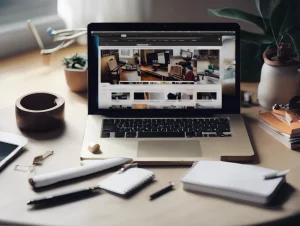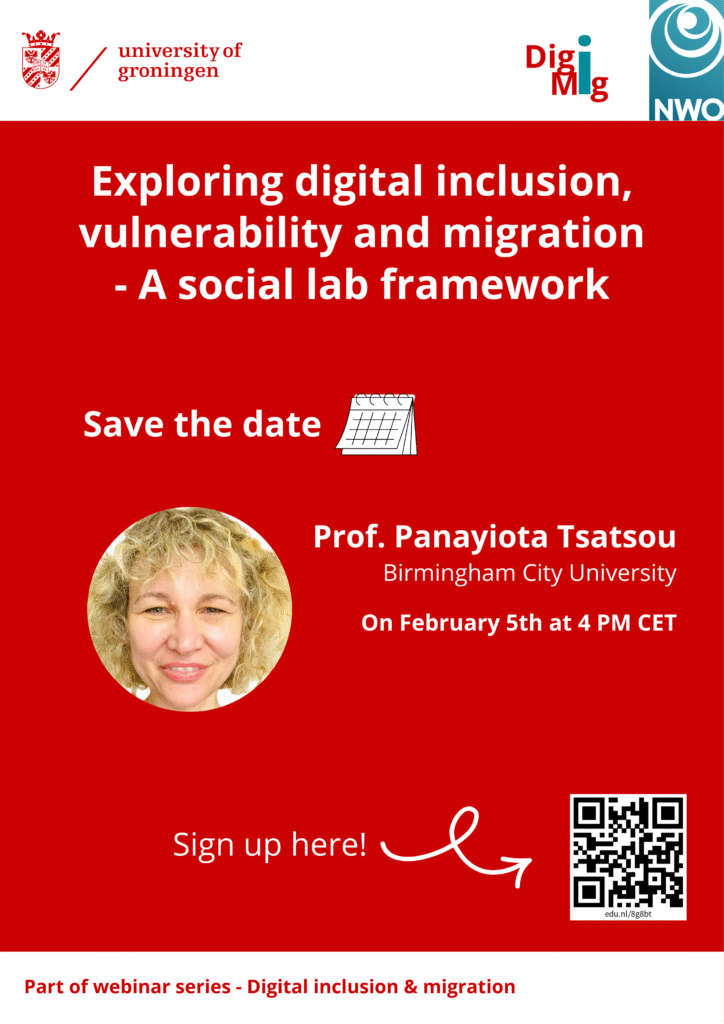Webinar series Digital Inclusion and Migration
The DigiMig Webinar Series brings together leading scholars in media and migration studies to discuss how digital technologies shape inclusion, inequality, and everyday life across migrant generations. Organized by the DigiMig research team at the University of Groningen, these webinars explore themes such as digital literacy, intersectionality, wellbeing, and transnational networks.
About the webinar series
From fall 2025 the first webinar will take place in the Digital Inclusion and Migration webinar series. Topics covered include for example: digital migration, transnational ageing migrants, intersectionality, gender, newcomers, digital wellbeing in schools. The series will consist of 6 webinars in total ranging from November 2025 to June 2026.
The Webinar Series aims to create a space for exchange and reflection on how digital technologies shape experiences of migration, belonging, and participation. By bringing together research from different disciplines and countries, the series highlights diverse perspectives on digital inclusion — from education and labour integration to gender and ageing. The series are welcome to all who are interested.
About DigiMig
The DigiMig project is led by Assoc. Prof. Dr. Çiğdem Bozdağ at the University of Groningen. It investigates from an intersectional perspective how social and cultural factors influence digital inclusion in the Netherlands with a focus on migration together with other factors. The project focuses on three key areas:
- How digital media is used by families with a migration history, with attention to both parents and children.
- How digital inclusion policies take cultural diversity into account.
- How digital literacy is taught in schools with diverse student populations.

Next webinar
Panayiota Tsatsou
“Exploring digital inclusion, vulnerability and migration: A social lab framework“
05/02/2026 4 PM CET (Amsterdam)

Read more
This talk introduces a novel social lab framework for researching digital inclusion among vulnerable communities, with a particular focus on migrants and ethnic minorities. Developed in response to the persistent marginalisation of these groups in both digital systems and
research agendas, the framework is grounded in intersectionality and Foucauldian theory, and shaped by a decolonial epistemology that centres lived experience, power relations, and
plural ways of knowing. Drawing on a 2024 study, I demonstrate how the framework enables a rich, multi-level
exploration of the “digital good” across four life domains: health, social welfare, education, and social networking. Participants, including migrants and ethnic minorities, shared
complex, often ambivalent experiences of digital technologies—as sources of empowerment,
but also exclusion. Their recommendations called for culturally responsive support, inclusive
design, and greater recognition of community-based knowledge and informal expertise. The findings highlight the value of the social lab as a participatory, interdisciplinary space for
generating grounded insights and practical interventions. More broadly, the framework offers
a new direction for digital inclusion research—one that brings the digital lives of vulnerable
communities such as migrants and ethnic minorities from the margins to the centre of
scholarly and policy attention.
Speaker Details
Prof. Panayiota Tsatsou (PhD, SFHEA)
Professor in Media Diversity Co-Chair of the IAMCR Working Group ‘Inclusive Communication and PwDs’ Sir Lenny Henry Centre for Media Diversity
Department of English and Media Birmingham City University
E: panayiota.tsatsou@bcu.ac.uk
Upcoming webinars
Registration
Lecturers, researchers, PhDs, students, and other interested parties are invited to participate in the sessions. Registration is open for all sessions. Please register by clicking the button below. We will send you the details to follow the webinars via email. For questions regarding the webinar series, please contact Denise Mensonides (d.mensonides[@]rug.nl) or Cigdem Bozdag (c.bozdag[@]rug.nl).
